Key Highlights
- Latest Comprehensive Guide to Spouse Visitor Visa Canada 2025
- Spouse Visitor Visa Canada from India: Essentials
- Spouse Visitor Visa Canada Processing Time & Success Factors
- Spouse Visitor Visa Canada Fast-Track Options: Open Work Permit After Arrival
- Canada’s Commitment to Family Reunification: Policy Updates (2024–2025)
- Latest Cost and Fees for Spouse Visitor Visa Canada in 2025
- Latest 2025 Immigration Trends for Indian Families
- Spouse Visitor Visa Canada Practical Checklist: Ensuring a Strong Application in 2025
- Real Applicant Experiences and Testimonials for Spouse Visitor Visa Canada 2025
- Latest Facts & News on Spouse Visitor Visa Canada (2024-2025)
- Conclusion
As a family, when you bring your loved one to Canada temporarily,it is considered a great move when seeking reunification. Spouse visitor visa Canada, or more precisely, Temporary Resident Visa (TRV), will enable your spouse to stay in Canada with you temporarily. The blog is thorough; it is written by specialists, and it provides the latest and up-to-date material to follow by 2025 in order to overcome the application process.
Latest Comprehensive Guide to Spouse Visitor Visa Canada 2025
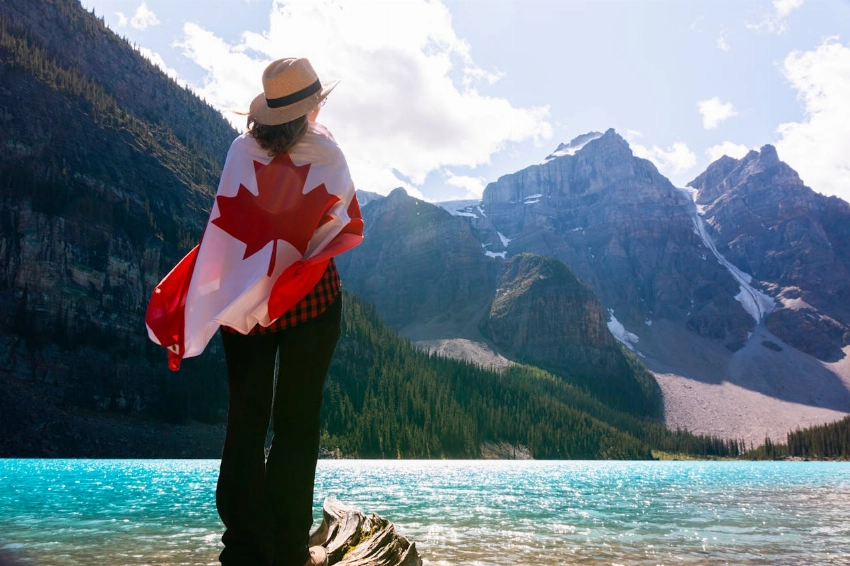
In this part, you will get an insightful map on how to understand and obtain a Spouse visitor visa from India to Canada, especially for an Indian. The given information is prepared in accordance with the most up-to-date processes and the perspectives of specialists in the field of immigration in 2025.
What Is A Spouse Visitor Visa Canada?
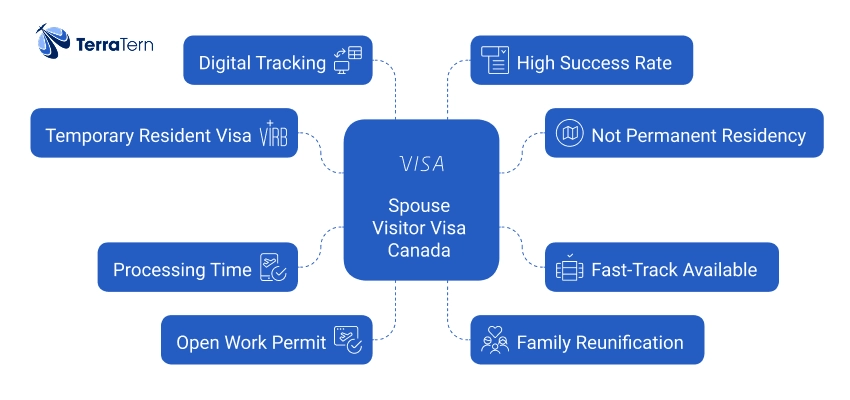
The Spouse visitor visa Canada from India, which is technically called Temporary Resident Visa (TRV), is a non-immigrant visa which enables a foreign spouse to come to visit his/her Canadian citizen or permanent resident spouse in Canada. It is also a temporary visa to which the family is reunited to reside in Canada in the interim time a possible permanent residency application is reached, or just to visit. It is important to establish that a Spouse visitor visa Canada from India is not an express passage to permanent residency; rather a temp permit of access. This is not the same as a spousal sponsorship application, which is how one discovers to gain permanent resident status.
Also Read: Canada Tourist Visa from India: Fees, Eligibility, Time
Spouse Visitor Visa Canada from India: Essentials

Applicants who are Indian will need to know some peculiarities concerning the documentation, process, and cultural aspects when applying for a spouse visitor visa Canada from India. Since there seems to be a lot of applications in India, it is common to find that the IRCC offices tend to have a certain expectation as to the completeness and genuineness of applications from this region.
These are some of the important things that the Indian applicants should take into account:
-
Cultural Context: A Marriage certificate is not everything on an Indian application; the culture of the relationship, evidence of the relationship through wedding pictures, reception details and evidence of a family gathering helps to support the authenticity of the marriage tie.
-
Financial Documentation: Applicants who are Indian should offer solid financial documentation of the applicant and the Canadian sponsor to establish that they have sufficient finances to cover their stay and the willingness to come back. This comprises bank statements, income proof, and property.
-
Refusal Patterns: Refusals apply to Indians very often because they are seen as not possessing strong bonds to their home country or not having enough money. It is crucial to handle these concerns in the application.
-
Visa Application Centres (VACs) in India: In India, applicants are most likely to come in contact with the Visa Application Centres (VACs) to submit biometrics as well as/or receive the documents back; therefore, it is worth knowing where they are located and how they work.
Application Process for Canada Visitor Visa for Spouse from India in 2025
When applying for a Canada visitor visa for spouse from India, the same attention should be paid to detail and following the recommendations of the IRCC. When an application is well prepared, it boosts the probability of the granting of the licence.
This is a step-by-step walk-through of Canada visitor visa for spouse from India:
-
Step 1: First of all, both the applicant (spouse) and the inviting party (Canadian citizen/PR) should address the eligibility requirements to obtain a visitor visa. Some of the indicators are the intention of the applicant to depart Canada on completion of his or her authorisation of stay in Canada and the availability of financial funds adequate to sustain the intended stay without relying on Canadian citizens and residents. Additionally, it is important not to have any inadmissibility concerns.
-
Step 2: This is the most important step. Check the approved list of documents (which includes a checklist of documents required by the IRCC visitor visa).
-
Step 3: You will be required to complete all of the available application forms; ensure they are filled out properly and comprehensively. Delays or refusal may be a result of misinformation or omissions.
-
Step 4: Pay the application fees required online on the IRCC portal.
-
Step 5: Biometrics: After the application has been submitted, you will be given a Biometrics Instruction Letter (BIL). Within 30 days of this letter, you should give your biometrics (fingerprints and photo) at a selected VAC in India.
-
Step 6: Medical Exam (When Necessary). There may be a need to conduct a medical exam, but this is dependent on your country of origin and the number of months that you plan to stay. In that case, IRCC will give you instructions. This should be done by an IRCC-approved panel physician.
-
Step 7: IRCC will look at your application. The new digital tools will help to track the status online.
-
Step 8: In case of approval, you will be informed with a passport request letter. In case of refusal, you will be notified with the refusal letter with the reasons.
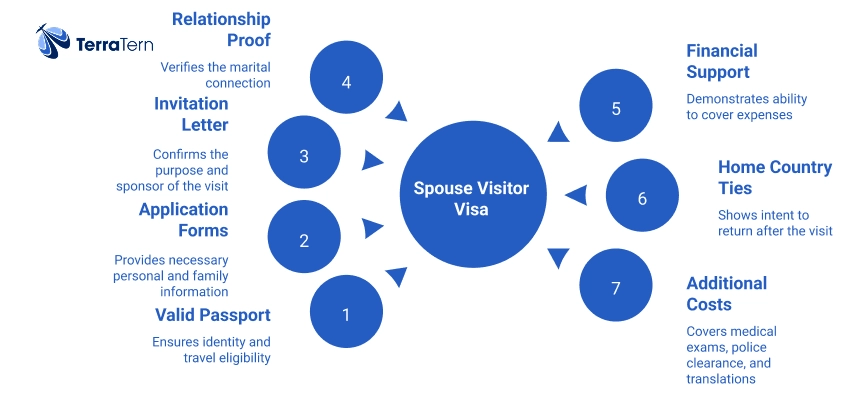
Documents Required for Spouse Visitor Visa Canada
A spouse visitor visa Canada will specify the following documents as the basis of a thorough and solid application:
-
Valid Passport: The applicant should have a valid passport that is not less than six months beyond the duration of the intended time in Canada.
-
Application Forms: Properly filled out and signed forms, which come in the form of an application for a temporary resident visa (IMM 5257), family information (IMM 5645), and Schedule 1 application for a temporary resident visa (IMM 5257-Schedule 1) when applicable.
-
Invitation Letter: a teeth invitation letter by the Canadian spouse to the visiting spouse detailing why this visit needs to be made, how long it is going to be, and the intent to support the financial needs of the visiting spouse.
-
Evidence of Financial Support: Bank statements, employment letters, pay stubs, and other financial documents of the applicant and his or her Canadian spouse indicating that it has enough funding to cover the stay of the visitor without having to use social welfare funds.
-
Evidence of Relationship: Marriage certificate, photographs of the wedding, joint bank accounts, property documents, and communication (call log, chat logs) to evidence the relationship between the two runs in a genuine and continuing way.
-
Connections to the Home Country: Factors tying them to India e.g., property owner, job letter (re-assuring that the person will resume work on the specified date after the leave has been granted), family like children and others, as well as financial investments to prove to the visa officer that the person will go back to their home country.
-
Travel Plan: Proposed idea of travelling, flight reservations (not necessarily bought yet, but reserved), as well as plans on staying.
-
Travel Insurance: Showing full travel insurance to cover the period of stay within the borders of Canada.
-
Digital Photo: Digital Photo matches IRCC requirements.
Any other documents that IRCC may require or feel are relevant to buttress the application.
Supporting Your Application: Proof of Relationship for Spouse Visitor Visa Canada
Convincingly demonstrating a genuine marital relationship to Canadian authorities is paramount for a successful spouse visitor visa Canada application. IRCC scrutinises these claims to prevent misrepresentation and ensure the integrity of the immigration system.
Here’s how to provide robust proof of relationship:
-
Official Documents
-
Marriage Certificate (mandatory).
-
If applicable, evidence of common-law partnership (e.g., shared address, joint bank accounts for at least 12 continuous months).
-
Photographic Evidence
A selection of photos spanning the duration of the relationship, including:
-
Wedding photos.
-
Photos with family and friends (both sides).
-
Photos from trips or significant life events together.
-
Ensure photos are clear, dated, and show both individuals clearly.
-
Communication History
Provide samples of communication that demonstrate an ongoing and regular relationship, such as:
-
Call logs (highlighting frequent calls).
-
Text messages or chat logs (WhatsApp, Viber, etc. – not just recent ones, but a selection over time).
-
Emails.
-
Screenshots of video calls.
-
Joint Financial and Property Documents (if applicable)
-
Joint bank account statements.
-
Joint credit card statements.
-
Property deeds or rental agreements in both names.
-
Utility bills are addressed to both partners at the same residence.
-
Affidavits/Letters from Third Parties
-
Letters from friends and family (especially from those who know the couple well) attest to the genuineness of the relationship. These letters should ideally be notarised.
-
Travel History Together
-
Copies of visas or passport stamps from joint travels.
-
Tickets or booking confirmations for trips taken together.
-
Other Supporting Evidence
-
Gift receipts exchanged.
-
Correspondence addressed to both partners.
-
Evidence of shared responsibilities or plans.
Remember, quality over quantity is key. A few strong, diverse pieces of evidence are better than a large volume of repetitive or unconvincing documents. Provide explanations where necessary to connect the dots for the visa officer.
Spouse Visitor Visa Canada Processing Time & Success Factors

Understanding the average processing durations, current IRCC standards, and real user experiences can greatly assist in managing expectations for a spouse visitor visa Canada processing time. While official processing times are estimates, several factors can influence the actual duration.
Approximate Visitor Visa Processing Times (as of 2025 estimates): Updated
Here is the breakdown of Spouse visitor visa Canada Processing Time:
|
Application Type |
Country (Primary Applicant) |
Average Processing Time |
Notes |
|
Visitor Visa |
India |
2-4 weeks (after biometrics) |
Can be faster with AOR for PR sponsorship. |
|
Visitor Visa |
Other High-Volume Countries |
3-6 weeks (after biometrics) |
|
|
Visitor Visa with AOR |
Global |
As little as 14 days (for eligible cases) |
This is an expedited pathway for spouses with an active PR sponsorship application. |
Latest Factors Influencing Processing Times for Spouse Visitor Visa Canada in 2025
Here are the factors influencing the Spouse visitor visa Canada processing time:
-
Completeness of Application: Incomplete applications are the leading cause of delays. Ensure all forms are filled correctly and all required documents are included.
-
Complexity of the Case: Applications with unique circumstances, such as past refusals, criminal records, or complex family situations, may take longer.
-
Volume of Applications: High application volumes at specific IRCC offices can lead to increased processing times.
-
Responding to IRCC Requests: Promptly providing any additional documents or information requested by IRCC can prevent delays.
-
Biometrics and Medical Exams: The time taken to complete biometrics and medical exams, and for results to be updated, can impact the overall timeline.
-
Country of Application: Processing times vary significantly by country due to local conditions and diplomatic relations.
Tips for Improving Approval Odds and Avoiding Delays
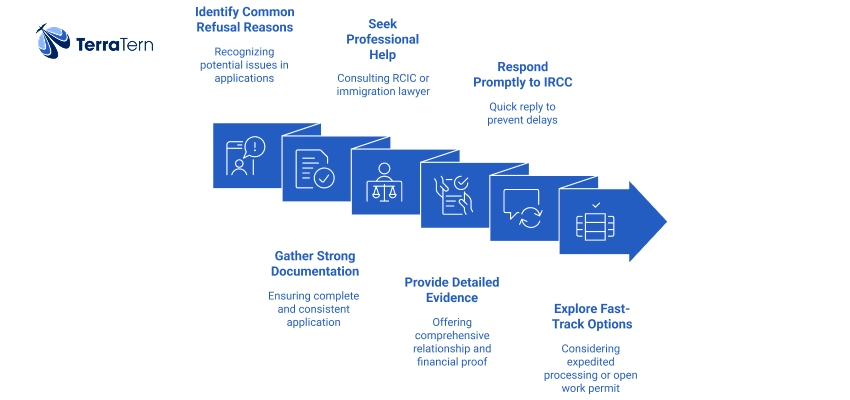
Here are some tips to improve your approval rate and avoid delays for Spouse visitor visa Canada:
1. Strong Ties to Home Country: Provide irrefutable evidence that you will return to your home country after your visit. This includes:
- Employment letter confirming your job, salary, and approved leave of absence, with a clear return date.
- Proof of property ownership (deeds, rental agreements).
- Family responsibilities (e.g., caring for elderly parents, dependent children not accompanying).
- Significant financial assets in India.
2. Sufficient Funds: Demonstrate ample funds to support your stay in Canada and your return journey, without relying on Canadian public funds. This includes bank statements, income proof, and a letter from your Canadian spouse confirming financial support.
3. Clear Purpose of Visit: Articulate a clear and consistent purpose for your visit, supported by an invitation letter and a detailed itinerary.
4. Genuine Relationship Proof: As highlighted earlier, provide comprehensive evidence of your genuine relationship.
5. Honesty and Consistency: All information provided in your application must be truthful and consistent across all documents. Misrepresentation can lead to a multi-year ban.
6. Professional Assistance: Consider consulting with an immigration lawyer or Regulated Canadian Immigration Consultant (RCIC) to ensure your application is strong and complete, especially for complex cases.
IRCC's commitment to family reunification includes an expedited pathway for those with an Acknowledgement of Receipt (AOR) for a PR application. This policy aims to facilitate quicker visits for spouses already in the sponsorship queue.
Also Read: SOP for Canada Tourist Visa: New Expert Guide & Samples
Spouse Visitor Visa Canada Fast-Track Options: Open Work Permit After Arrival
A significant advantage for spouses with a permanent residence application in process is the possibility of obtaining an Open Work Permit (OWP) after entering Canada on a visitor visa. This option allows the visiting spouse to legally work in Canada while their PR application is being processed, providing financial stability and the ability to contribute to the Canadian economy.
Eligibility Criteria for an Open Work Permit for Spouses in Canada:
To be eligible for an Open Work Permit under this pathway, the visiting spouse generally needs to meet the following criteria:
-
Valid Temporary Resident Status: The applicant must be in Canada with valid temporary resident status (e.g., as a visitor).
-
PR Application In Process: The Canadian spouse must have submitted a Spousal Sponsorship application, and the applicant must be the principal applicant on that PR application. An AOR from IRCC for the PR application is typically required.
-
Genuine Relationship: The relationship must be genuine and meet IRCC's requirements.
-
Admissibility: The applicant must be admissible to Canada (no criminal record, medical inadmissibility, etc.).
-
No Refusal for PR Application: The PR application should not have been refused.
Practical Checklist for Applying for an OWP after Visitor Visa:
The practical checklist for applying for an OWP after a visitor visa:
-
Confirm PR Application Status: Ensure your spouse's PR sponsorship application has been submitted and you have received the AOR.
-
Maintain Valid Visitor Status: Do not let your visitor status expire while in Canada. Apply for an extension if needed.
-
Gather Required Documents: Prepare copies of your valid visitor status document, your spouse's PR AOR, marriage certificate, and other identity documents.
-
Complete the Open Work Permit Application: Fill out the "Application to Change Conditions, Extend my Stay or Remain in Canada as a Worker" (IMM 5710) form online.
-
Pay Applicable Fees: Pay the work permit fee and the open work permit holder fee.
-
Submit Application: Submit your application online through the IRCC portal.
-
Await Decision: Processing times for OWPs can vary but are generally faster for those with an in-process PR application.
This pathway is a crucial policy for family reunification, enabling families to live and work together sooner.
Canada’s Commitment to Family Reunification: Policy Updates (2024–2025)

Canada has consistently affirmed its commitment to family reunification as a cornerstone of its immigration policy. Over 2024 and 2025, several measures have been introduced or reinforced to streamline the process of bringing families together, including those from high-demand scenarios like India.
Key policy updates include:
-
Streamlined Digital Services: IRCC has invested in improving its digital application platforms, aiming to make the application process more user-friendly and efficient. This includes real-time tracking features and improved submission portals.
-
Public Policy Pilots: Certain temporary public policies have been implemented to address specific needs, such as the open work permit extensions for spousal applicants already in Canada, providing flexibility during processing times. These pilots reflect an adaptive approach to immigration challenges.
-
Prioritising Family Class Applications: Despite overall immigration targets, family class applications, including spousal sponsorship, remain a priority for IRCC. This prioritisation aims to reduce backlogs and facilitate faster processing for loved ones.
-
Lessons from High-Demand Scenarios (e.g., India): IRCC continuously analyses data from high-demand countries like India to identify bottlenecks and implement targeted solutions. This can include allocating more resources to specific visa offices or introducing country-specific processing guidelines.
-
Emphasis on Genuine Relationships: The increased scrutiny on proof of relationship is a direct policy response to ensure the integrity of family reunification programs, combating potential misrepresentation. This benefits genuine applicants by differentiating them from fraudulent ones.
These ongoing policy adjustments demonstrate IRCC's dedication to making family reunification smoother and more accessible, while maintaining the security and integrity of Canada's immigration system.
Common Reasons for Visa Refusal & How to Prevent Them?
Despite Canada's commitment to family reunification, visa refusals do occur. Understanding the top causes of denials can help applicants proactively strengthen their submissions and increase their chances of approval.
Common Reasons for Spouse visitor visa Canada Refusal and Prevention Strategies
|
Reason for Refusal |
Data-Driven Fixes / Prevention Strategies |
|
Lack of Ties to Home Country |
Actionable Tips: Provide extensive documentation proving strong connections to India. This includes: - Employment: Letter from employer confirming stable employment, approved leave dates, and expected return. - Property: Proof of ownership of real estate (house, land) or long-term lease agreements. - Family: Birth certificates of dependent children not travelling, evidence of care for elderly parents. - Financial: Substantial bank balances in India, investments, business ownership documents. |
|
Insufficient Funds |
Actionable Tips: Demonstrate clearly that you (or your sponsor) have adequate financial resources to cover all expenses during your stay in Canada and your return. - Bank Statements: Provide original, recent bank statements showing consistent funds. - Income Proof: Salary slips, tax returns for both applicant and sponsor. - Sponsor's Letter: A detailed invitation letter from the Canadian spouse confirming financial support, along with their financial documents. - Travel Insurance: Proof of comprehensive travel medical insurance. |
|
Unclear/Insufficient Purpose of Visit |
Actionable Tips: Clearly articulate the reason for your visit. - Invitation Letter: A well-written, specific invitation letter from the Canadian spouse detailing the purpose of the visit (e.g., to spend time together, attend a family event), planned activities, and duration. - Itinerary: A tentative travel itinerary outlining where you plan to go and what you plan to do. |
|
Poorly Documented Relationship |
Actionable Tips: Provide compelling evidence of a genuine, ongoing relationship beyond just a marriage certificate. - Comprehensive Photo History: Dated photos with your spouse, family, and friends over time. - Communication Logs: Screenshots of chat conversations, call logs, and emails demonstrating regular contact. - Joint Documents: If applicable, joint bank accounts, shared utility bills, shared property documents. - Affidavits: Letters from friends/family confirming the authenticity of your relationship. |
|
Misrepresentation or Inconsistencies |
Actionable Tips: Be entirely truthful and ensure consistency across all documents. - Review Thoroughly: Double-check all forms and supporting documents for any discrepancies in dates, names, employment history, or travel history. - Disclose Everything: Do not withhold information, even if it seems minor (e.g., previous visa refusals from any country). Explain any complexities or past issues clearly in a cover letter. |
|
Previous Visa Violations |
Actionable Tips: If you have overstayed a previous visa, worked without authorisation, or violated immigration laws in any country, this will likely lead to refusal. It is extremely difficult to overcome. Seek legal advice if this applies. If minor, provide strong evidence of rehabilitation and good conduct since the violation, and emphasise strong ties to the home country. |
|
Health or Security Concerns |
Actionable Tips: Undergo required medical exams promptly and disclose any relevant medical history. For security, ensure you have no criminal record or associations that could deem you inadmissible. If you have a criminal record, consult with an immigration lawyer about rehabilitation options before applying. |
By meticulously addressing these common pitfalls, applicants can significantly enhance the strength of their spouse visitor visa Canada application.
Latest Cost and Fees for Spouse Visitor Visa Canada in 2025

Understanding the financial outlay is a crucial part of planning your spouse visitor visa Canada application. The costs generally include application fees, biometric fees, and potential additional expenses.
Table 3: Estimated Costs for Spouse Visitor Visa Canada (2025)
|
Fee Type |
Cost (CAD) |
Notes |
|
Visitor Visa (per person) |
100 |
Single or multiple-entry temporary resident visa. |
|
Visitor Visa (per family) |
500 |
Maximum fee for a family of 5 or more people applying at the same time and place. |
|
Biometrics (per individual) |
85 |
Required for most applicants aged 14 to 79. Valid for 10 years. |
|
Biometrics (per family) |
170 |
Maximum fee for a family of 2 or more eligible people applying at the same time (spouse, common-law partner, dependent children). |
Expected Extra Costs
Here are the expected extra costs for Spouse visitor visa Canada:
-
Medical Exam Fees: If a medical exam is required (dependent on country of origin and duration of stay), the cost is paid directly to an IRCC-approved panel physician. These costs can vary, often ranging from 100 to 200.
-
Police Clearance Certificates: Fees for obtaining police clearance certificates from your home country and any country where you have lived for six months or more since the age of 18.
-
Translation Fees: If any supporting documents are not in English or French, certified translations will be required, incurring additional costs.
-
Courier Fees: For submitting passports or documents to the VAC or IRCC.
-
Consultation Fees: If you opt to use the services of an immigration consultant or lawyer.
-
Travel Insurance: Mandatory for visitors and a crucial expense.
Refund Guidelines
Application fees are generally non-refundable once IRCC has started processing your application, even if it is refused. Biometric fees are typically non-refundable once collected. It is essential to double-check the latest fee schedule on the official IRCC website before applying, as fees can change.
Latest 2025 Immigration Trends for Indian Families
In 2025, immigration trends for Indian families seeking to unite in Canada continue to highlight significant patterns and evolving dynamics. These trends are shaped by IRCC policies, global events, and ongoing demand.
-
Sustained Demand for Family Reunification: India consistently remains a top source country for all immigration streams to Canada, with a particularly high demand for family reunification. This trend is expected to continue throughout 2025.
-
Increased Digitalisation: The shift towards fully digital applications has streamlined submission processes, but also places a greater emphasis on correct online submission and digital literacy.
-
Focus on Genuine Relationships: IRCC's heightened scrutiny on proof of relationship means Indian families must be even more diligent in presenting comprehensive and authentic evidence of their marital bond, moving beyond traditional documentation.
-
Impact of Expedited Processing (AOR Pathway): The expedited visitor visa processing for spouses with a PR sponsorship AOR has been a welcome development, offering a faster route for many Indian families to be together sooner while awaiting their permanent residency. This has become a key strategy for many.
-
Navigating Processing Times: While some pathways are expedited, overall processing times for various visa categories can still be substantial due to high volumes. Indian applicants are encouraged to apply well in advance and remain patient.
-
Role of Immigration Professionals: Given the complexity and competitive nature of applications, many Indian families are increasingly seeking guidance from Regulated Canadian Immigration Consultants (RCICs) or immigration lawyers to ensure strong, error-free applications.
-
Challenges of Refusals: Despite the strong demand, refusal rates, particularly for visitor visas, remain a concern. Common reasons, such as insufficient ties to the home country or financial concerns, continue to impact Indian applicants.
These trends underscore the importance of thorough preparation, accurate documentation, and a clear understanding of IRCC's expectations for Indian families seeking to reunite in Canada in 2025.
Also Read: Canada Visa for Indians: Types, Process & Requirements
Spouse Visitor Visa Canada Practical Checklist: Ensuring a Strong Application in 2025
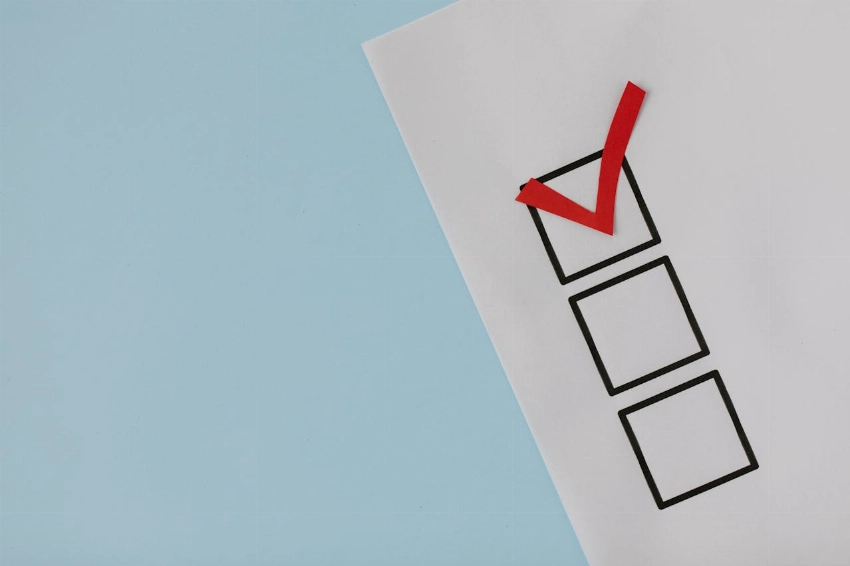
A comprehensive pre-submission checklist is essential for applicants aiming for a higher approval rate for their Spouse visitor visa Canada. This checklist helps ensure all critical aspects are covered before the application leaves your hands.
Here's a practical checklist to maximise your approval odds:
-
Eligibility Confirmation:
-
Confirm applicant (spouse) meets all visitor visa criteria (e.g., intent to leave, no inadmissibility).
-
Confirm Canadian spouse is a citizen or permanent resident.
-
Document Gathering (Applicant):
-
Valid passport (with sufficient validity).
-
Duly completed and signed application forms.
-
Proof of financial stability (bank statements, property, investments).
-
Evidence of strong ties to India (employment letter, property deeds, family responsibilities).
-
Digital photo meeting IRCC specifications.
-
Travel insurance proof for the intended duration.
-
Police Clearance Certificates (if required).
-
Medical Exam results (if required).
-
Document Gathering (Sponsor in Canada):
-
Copy of Canadian Citizenship/PR card.
-
Invitation letter (detailed, specific purpose, duration, financial commitment).
-
Proof of financial capacity (income, employment, bank statements).
-
Proof of relationship (marriage certificate, photos, communication, joint documents).
-
Proof of address in Canada.
-
Relationship Evidence:
-
Marriage Certificate.
-
Photo album (dated, with captions, showing relationship progression).
-
Communication logs (messages, call history, emails).
-
Affidavits from family/friends.
-
Application Submission:
-
All forms are completed accurately and consistently.
-
All required fees paid online.
-
Biometrics were scheduled and completed promptly upon receiving BIL.
-
All supporting documents were uploaded clearly and correctly.
-
Review and Double-Check:
-
Self-review all documents for accuracy and completeness.
-
Consider having a trusted person or immigration professional review the application.
-
Ensure consistency of information across all documents and forms.
-
Contingency Planning:
-
Have a plan for extending status if processing takes longer than expected or if you wish to stay longer.
-
Be prepared for potential interviews or requests for additional information from IRCC.
Adhering to this checklist significantly reduces the risk of common errors and strengthens your application.
Real Applicant Experiences and Testimonials for Spouse Visitor Visa Canada 2025
Hearing from individuals who have successfully navigated the Spouse Visitor Visa Canada process can provide invaluable insights and encouragement. Many applicants share their journeys on online forums, social media, and YouTube, offering a glimpse into what worked and what didn't.
Common themes from real applicant experiences often include:
-
The Power of a Strong Invitation Letter: Many successful applicants emphasise the importance of a detailed and heartfelt invitation letter from the Canadian spouse, clearly outlining the purpose of the visit and the commitment to support the visitor.
-
Overcoming Financial Hurdles: Testimonials frequently highlight the challenge of demonstrating sufficient funds, especially from India. Successful applicants often detail how they meticulously gathered bank statements, salary slips, and sponsor support letters to address this.
-
Proof of Ties to Home Country is King: Almost universally, applicants stress that convincing IRCC of their intent to return to India was the most critical hurdle. Stories of providing detailed property documents, employment letters with approved leave, and clear family responsibilities abound.
-
Patience and Persistence: The process can be lengthy and emotionally taxing. Many shared experiences underscore the need for patience and persistence in dealing with potential delays or requests for additional information.
-
Impact of Expedited AOR Pathway: Recent testimonials from 2024-2025 specifically praise the expedited processing for those with a PR sponsorship AOR, with some reporting approvals in a matter of weeks, significantly reducing separation time.
-
Learning from Refusals: While success stories are encouraging, accounts of initial refusals often provide valuable lessons on what went wrong and how applicants rectified issues in subsequent applications, typically by strengthening ties to their home country or providing financial proof.
-
The Value of Professional Advice: Many successful applicants credit their immigration consultants or lawyers with guiding them through complex requirements and ensuring their application was robust.
These real-world examples serve as a testament to the fact that while challenging, securing a Spouse Visitor Visa Canada is achievable with meticulous preparation and an understanding of IRCC's expectations.
Latest Facts & News on Spouse Visitor Visa Canada (2024-2025)
The Canadian immigration landscape is always changing, and it is always essential to know the current situation in order to complete the application successfully. These are the latest changes that have affected Spouse visitor visa Canada from India:
-
Faster visitor visa processing to PR Sponsorship: AOR Holders Immigration, Refugees and Citizenship Canada (IRCC) now provides faster processing of visitor visas to spouses with a legitimate Permanent Residence (PR) sponsorship Acknowledgement of Receipt (AOR). This translates to a processing time of as low as 14 days in the case of eligible applicants, but this is dependent on the country and complexity of the cases.
-
India as a Key Source Country: India remains among the leading source countries of the Spouse visitor visa Canada applicants in 202,5, which highlights the family reunion demand in the region.
-
Processing Times of Indian Applicants: As of 2011, the average processing time of a spouse visa (Permanent Residence route) originating in India has been about 712 months; however, visitor visas awarded on an AOR have the potential of being much shorter.
-
Open Work Permits: These are temporary policy changes that took effect in 2024 that allowed an extension to the duration of open work permits for spousal applicants already in Canada. These would assist family members to remain and work in the country as their permanent residence, sponsoring application is made to bring family unity and input to the economy.
-
Significance of Broad Documentation: Candidates are highly advised to provide every supplementary document, though some of them may not be essential. This completeness can enhance their opportunities of acceptance in the competitive application scene drastically.
-
Biometrics and Medical exams: Up to 2025, biometrics and medical checks are still considered to be a part of the procedure. Others can be prepared before made thus hastening the entire process of approval.
-
How do Visa Refusal Rates fluctuate: Visa refusal rates are dynamic and can vary. The major causes of rejection are a lack of connection with the homeland, a lack of financial support or poorly submitted connections. The best way of ensuring that refusal is avoided is to plug these areas.
-
New IRCC Digital Tools: IRCC has improved on their digital tools, specifically in the sense that one is able to track the application of sa pouse visitor visa in real-time. This gives more openness, and an applicant can check how his/her application is progressing.
-
Additional Oversight Over Proof of Relationship: Proof of relationship has been subject to more attention in 2024 and 2025. In addition to a marriage certificate, an applicant ought to give a detailed history including photos, communication records and other evidence to show that they were indeed in a relationship.
-
Eligibility to Open Work Permit After Arrival: Spouses and partners who come to Canada on a visitor visa may be able to apply for an Open Work Permit if their Permanent Residence application is already underway. This presents them with an avenue to work legally as they wait to get the results of their sponsorship.
Curious about bringing your spouse to Canada faster? Get expert, up-to-date guidance on the evolving policies, common mistakes, and actionable tips to maximise your approval odds in 2025.
Conclusion
Navigating the Spouse Visitor Visa Canada landscape in 2025 requires a comprehensive understanding of evolving policies, meticulous preparation, and strategic documentation. This detailed guide has illuminated the key facts, application processes, and crucial factors that impact success, particularly for applicants from India. From the expedited processing for those with a PR sponsorship AOR to the critical emphasis on demonstrating genuine ties to your home country and sufficient financial capacity, every aspect plays a vital role.
The recent policy updates, including open work permit extensions for in-Canada spousal applicants, underscore Canada's ongoing commitment to family reunification. By paying close attention to proof of relationship, meticulously gathering all required documents, and understanding common reasons for refusal, you can significantly enhance your approval odds.
While the journey can be complex, leveraging digital tools and considering professional guidance from a Regulated Canadian Immigration Consultant (RCIC) or immigration lawyer can provide invaluable support, ensuring your application is robust and well-positioned for a positive outcome. Remember, thoroughness and honesty are your strongest allies in bringing your loved one to Canada. Visit TerraTern to know more!






